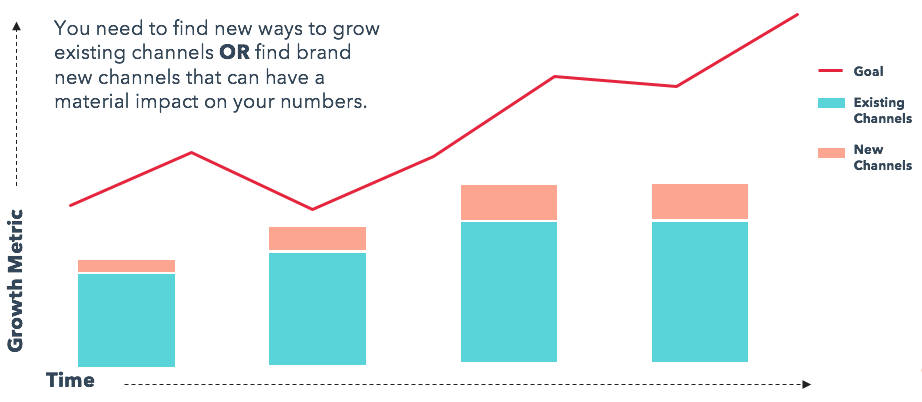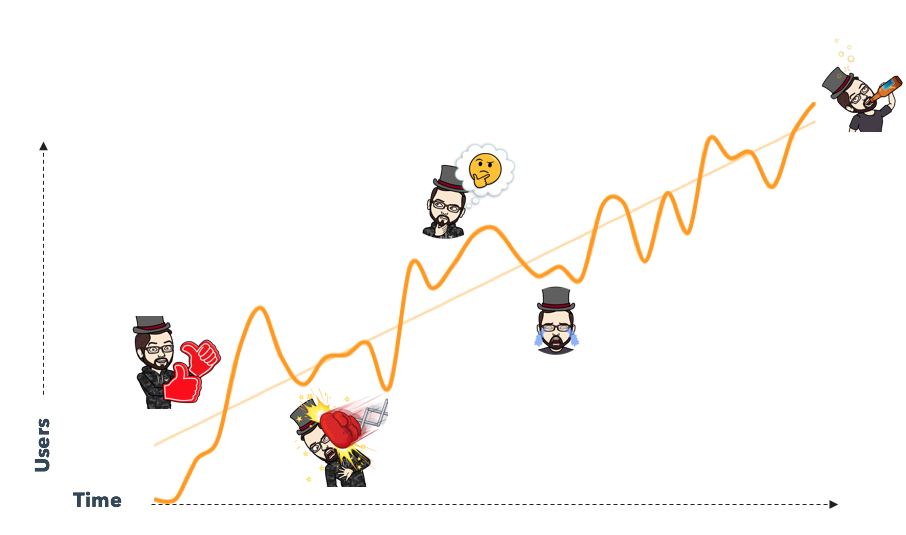What we cover in Episode 12
It probably comes as no surprise that one of the hardest things to do in a scale-up is to grow demand for your products and services every year.
You have to find new ways to grow from existing channels or find brand new channels that can support future growth.

For scale-ups, there are no up and to the right curves for customer acquisition. Instead, you'll hit growth ceilings that you need to think your way through.
As an example, here is a real chart from one of the metrics I'm accountable for at HubSpot. It's a series of ups and downs, but over an 18 month period, we've been very successful in growing that metric.

The scale-ups that succeed figure out how to break through their growth ceilings.
In this 3 part series on scale-up growth, we're going to talk about three important topics that can help you both avoid and break through these ceilings when you encounter them.
- Scale-up Part 2: Setting up your team for success
- Scale-up Part 3: How to Prioritize Acquisition Channels
Get notified when part 2 and 3 come by hitting the subscribe button.
1. The most important job a manager has is to hire and retain talented people.
When you become a manager, you realize your success isn't dependent upon how great of a marketer you are. Of course, that's important, but your success is dependent on how great of a team you build.
It's similar to how you would approach doing growth for a product. You need to attract new users, onboard them to the value of your product and retain them. If you have lousy retention, then everything else will fall apart.
Your job is to hire people who are better at the thing you used to do. That can be a lot to get your head around as a new manager.
"So, the people on my team are going to be better than me? How can I be their manager if they know more than me?"
It's not that the marketing knowledge you have isn't valuable, it's that as a manager a percentage of your time is now dedicated to on making sure you create a great work environment for your team. Removing blockers for them, getting them resources to be successful, helping them through problems they have.
Having people on your team who are more skilled than you means you're doing a great job!
2. Managers should get great at sourcing tactics.
To source talented candidates for growth roles, you should utilize the same techniques you would for acquiring new users onto the products. Go where the fish are. Where do those types of candidates hang out?
First get very clear on the type of person you're looking for, much like you would build out a persona for your product. Create a scorecard that has things like, your team values, so you'll know if the candidate is a good team fit. You should also include both the core and technical skills someone needs to be successful in the role. The more precise you are about these things, the better fit the person will be, and the more impact they'll be able to have.
Next, find those people. Here are some example techniques we used that have worked:
- Use LinkedIn recruiter to find people who have completed courses from known providers, like Reforge or Tradecraft.
- Use Followerwonk to look at the twitter followers of influencers in the field you're hiring. For example, for us, we want people who are interested in growth. We would look at who is following Brian Balfour, Casey Winters, and Noah Kagan. It will provide an instant pool of people who are worth considering.
- Look to see who is writing content on blogs that create content relevant to the field you're hiring. Again, using our example of growth, we would look at people who have written content on CXL, Reforge, Growthhackers.com.
3. Building a remote work culture gives you a competitive edge in hiring and retaining talent.
Creating a remote work culture and having flexibility around work is one of the best things you can do to both hire and retain talent.
Remote work can help to retain talent, a study published by Stanford University on remote work showed that "job attrition rates fell by over 50%."
Remote work can also help to attract talent; another study showed that 68% of job seekers who are millennials said an option to work remotely would significantly increase their interest in specific employers.
Remote work isn't without its challenges, and it's also not something everyone wants to do. A lot of people prefer to work in the office, but do appreciate the opportunity to work from home if required.
Creating a remote work culture for your team can definitely give you a competitive advantage in hiring and retaining talent.
Subscribe Rate and Review
>> Stitcher
>> Google Play
>> Spotify
Follow us on Social Media
>> @Searchbrat
>> @SJTousley
